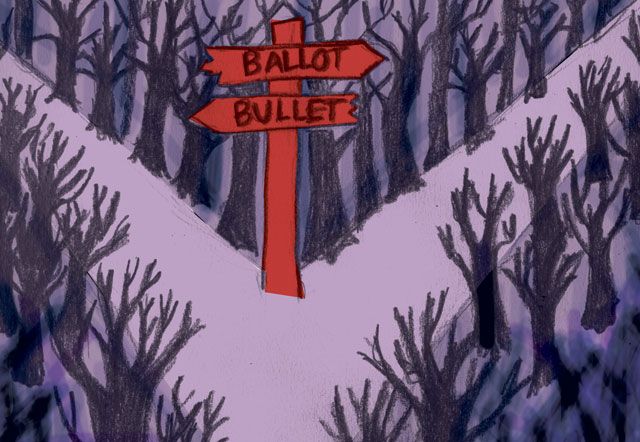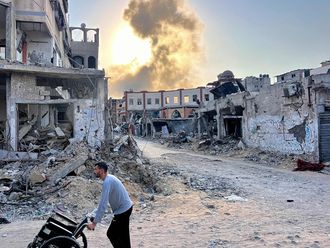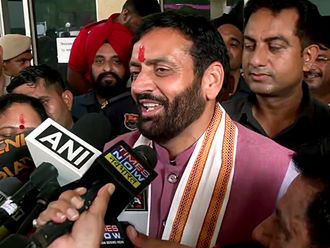The question has arisen because the Naxalites, the extreme leftists, have come to control almost one-sixth of the country — commonly known as the red corridor.
The central government has woken up to the challenge aimed at its authority rather late. The Naxalites, also called the Maoists, formed themselves into a political party in the late 1960s, when India began to have problems with China. The Communist Party of India (Maoist) has declared war against the state since 2004 and has indulged in limited violence since.
The guerrillas have grown in strength and support — particularly in West Bengal, Jharkhand, Orissa and, to some extent, in Andhra Pradesh. Last week, they stopped the Rajdhani Express in a jungle in West Bengal and detained the train for hours. Television channels were alerted and the story was publicised throughout the country.
A few days earlier, the Naxalites released a West Bengal police officer with a piece of paper attached to his shirt on which was written the letters POW. This was their reply to New Delhi's appeal to them to denounce violence without surrendering their arms and start a dialogue.
Society is overwhelmingly against their methods, but generally agrees with their demand to improve the living conditions of a vast majority of people. This gives the Naxalites strength. Many people travelling in the hijacked train were ‘impressed' by the Naxalites' non-violent protest and said so.
The armed revolution to ‘liberate' the country and the fight against poverty are entirely different issues, but the Naxalites have been able to confuse the two. One relates to the use of weapons and the other to development. It is true that the different ruling parties have failed to eradicate deprivation, but it is equally true that democracy means pursuing the rule of law, not violence. An armed revolution does not fit into the nation's ethos, however frustrating the democratic process may be.
The Naxalites are wrong to claim that they have liberated one-sixth of the country. No doubt, they have given a better deal to the downtrodden Adivasis — but the latter are also afraid to defy the Naxalites' guns.
In fact, the Naxalites' efforts are only hardening the intelligentsia's opinion against them. Bullets cannot replace ballots. If this were to happen, the state would in any case have the last word. The central government is itself indulging in excesses — the northeast is littered with examples of this. The recent dropping of 100,000 cases against Adivasis indicates how the police have been picking on them, charging them with theft for transgressions as basic as cutting down trees.
The Mahatma Gandhi commended the bravery of revolutionaries and praised Bhagat Singh, Sukhdev and Rajguru, who were hanged by the British, but differed with their methods. Another example is that of the Sikh militancy, which lasted for a decade. It ended when people turned against those who were killing the innocent.
Atrocities
The plight of the Adivasis and some others was taken up by the Naxalites because of the atrocities committed against them. They were helpless and nobody else cared. When a landlord takes away a villager's wife and keeps her in his house, what is the villager supposed to do?
This example can be multiplied. In most tribal areas such an atmosphere is prevailing. The objection is not against the protest raised by the Naxalites but the manner in which it is being done. The use of violence may give them a temporary victory in a limited area, but this is not a revolution. It is also far-removed from the ideology of Marxism, which is a quest for justice. This has been convincingly elucidated in Tristram Hunt's latest biography, Marx's General: The Revolutionary Life of Friedrich Engels.
The two Indian communist parties have also said that the Naxalites are not leftists — although the parties praise Stalin, who killed millions of innocent people. The ideology of Marxism should not be confused with force or the ambition to come to power without elections. People's willing consent is required and ‘justice' cannot be attained through the use of force.
Violence in India could lead to developments that might get out of hand — there are too many fissiparous forces. The outcome could be anything; dictatorship of the right or India's disintegration. That the system needs to be changed does not have to be overstated. When even after 62 years of independence, two-thirds of people remain poor, the overhauling of the system is essential.
Nevertheless, the ballot box should be the instrument of change. True, it has achieved little success in this area, but the fault is also that of the liberals. They missed their chance in 1977, when the Jayaprakash Narayan movement with the slogan of parivartan (change) defeated the Congress in the Lok Sabha elections. It was a revolution indeed, but those who won wasted that opportunity.
Kuldip Nayar is a former Indian High Commissioner to the United Kingdom and a former Rajya Sabha member.









